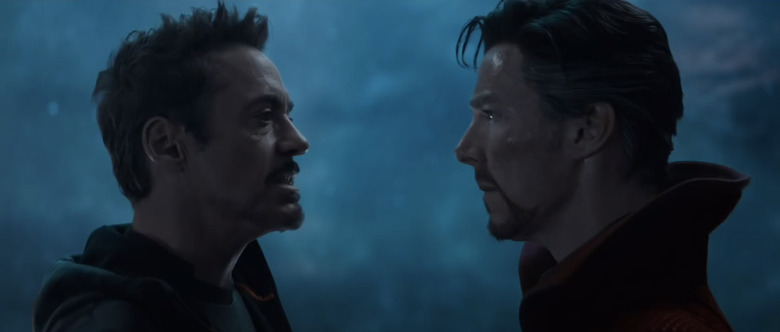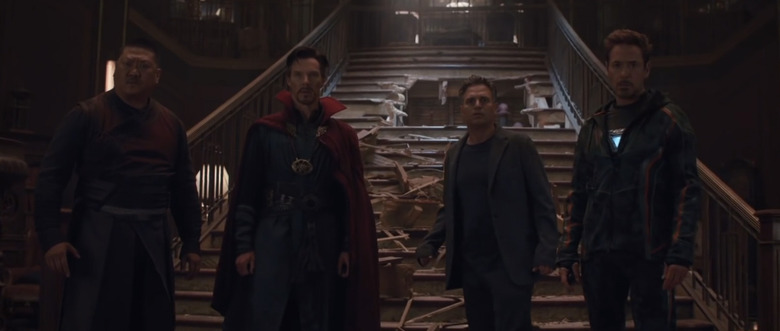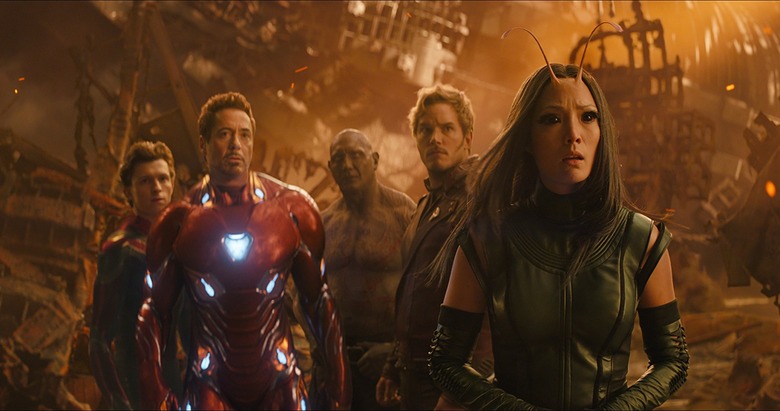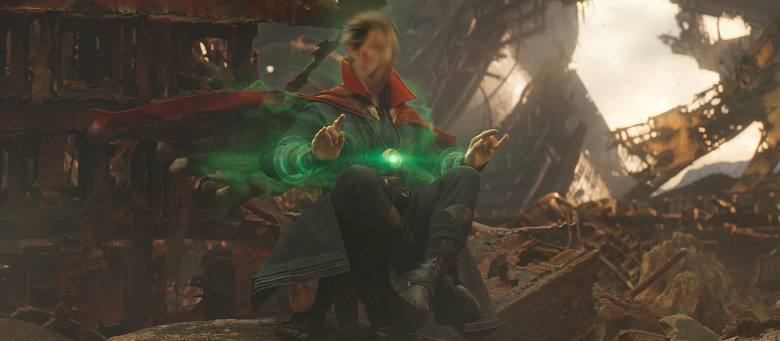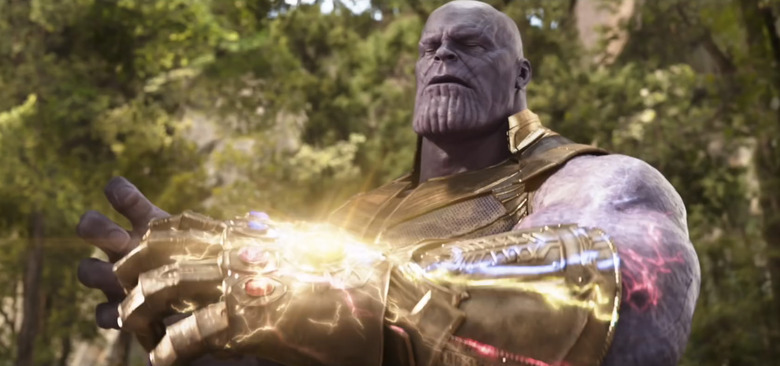Avengers Must Kill: Exploring Death In The Marvel Cinematic Universe
It would hardly be considered a spoiler at this point given the scale and cultural impact, but if you aren't caught up on the movies of the Marvel Cinematic Universe, consider this your only warning.
Avengers: Infinity War ended on a rather enormous cliffhanger, with half the Marvel heroes (along with half of all sentient life) dissipating into dust. The most impactful instance of an Avenger kicking it at Thanos' hand was Tom Holland's Spider-Man, whose death was drawn-out compared to his compatriots owing to Holland's performance. "I don't feel so good," he winced, before collapsing into Iron Man's arms; a memorable scene to be sure, but it's also the perfect jumping-off point for this two-fold discussion.
On one hand, Holland is currently filming Spidey sequel Spider-Man: Far from Home, set to release just weeks after the next Avengers, so his death won't really stick. On the other, Spider-Man is one of only two Marvel heroes (along with Evangeline Lily's The Wasp) who hasn't killed anyone. 20 entries in to the world's preeminent movie franchise, these seem like points worth discussing.
Most Avengers Kill
Wasp and Spidey being the only main characters who don't kill was brought up on Reddit, followed by the creation of this handy chart listing every MCU death and resurrection not including "disposable" aliens. While the finer details can be argued — Does Wong count as a "main character"? To what degree does Spidey coming up with the plan that kills Ebony Maw in Infinty War make him responsible? — death being the driving force behind Marvel's new big-bad casts an uncomfortable spotlight on the heroes. While they're separated from Thanos in theory, refusing to trade each other's lives while the Mad Titan kills his own daughter, a step back from the Soul Stone specifics paints a vastly different picture.
Sure, the "Outrider" alien troops are inherently disposable (suicidal, even) but they're disposable to Thanos, a villain to whom life itself is a mathematical equation. To the Avengers, who have spent many-a-film weighing one life against thousands, or thousands against billions (our Road to Infinity War series expands on this through-line), the very sentience of these Outriders, or Thanos' Chitauri in the first Avengers, reveals a nagging hypocrisy, to say nothing of the disposability of human villains and their henchmen.
Each film's fiction can certainly be used to justify these killings; Captain America: The First Avenger is a World War II film, and every second entry can be boiled down to "but the world was at stake!", which feels like part of the problem. Apocalyptic odds become a built-in excuse to avoid difficult conversations, but the Marvel Universe has, in fact, paid lip service to this debate before. Avengers: Age of Ultron introduces a villain who calls the heroes out on their bloodshed, though Ultron being a network of A.I. shifts the question of "Who deserves to die?" away from living villains and toward civilians, making the heroes choose between a single city and the entire planet; where The Vision's outlook on the sanctity of life could've been a moral foil to the Avengers, it ceases to be relevant once Ultron is destroyed.
More recent entries like Black Panther and Spider-Man: Homecoming at least see the heroes attempt to save their villains (per Holland, Spidey should never throw a punch as his strength could be lethal, and the character instantly turns off his suit's kill functions) but these, along with Ant-Man and the Wasp's tragic Ghost (Hannah John-Kamen), are standout instances. Generally speaking, Marvel villains "deserve" to die; beacon-of-morality Captain America may not kill anyone in The Winter Soldier, but he's comfortable letting his compatriots be executioners.
Capital Punishment
In 2013, Man of Steel ignited a never-ending debate about whether Superman should kill. Without rehashing the specifics, it's worth mentioning that, thematically muddled though it may be, the film's last-minute introduction of this debate as an afterthought rather than a central through-line still feels more substantial than anything in the MCU. No Avenger has ever stopped to question what is essentially the group's status quo; in Captain America: Civil War, the question of acting with impunity only surrounds civilian casualties, as opposed to the Avengers' lethal M.O.
While the logic of being killed because you put someone in danger ought to track, it isn't logic that drives a genre as fantastical as the superhero; rather, it's the placement of complex ideas in a digestible context featuring characters more capable than us. In the world of these films, extrajudicial execution is an accepted norm, understood to be justifiable and rarely given second thought.
And yet, these heroes combat fascist forces with fascism of their own — the longstanding "superheroes are inherently fascist" debate made mainstream — adjudicating capital punishment without question. Even if one follows the fiction of these films as an absolute (rather than a product of intentional construction with possible tweaks to ask the right questions), few of these deaths are cause for any sort of remorse on behalf of the heroes. Mantis of the Guardians regrets her complicity in the deaths of innocents, but Doctor Strange is the only Avenger who seems to regret having killed a "bad guy," even by accident. In Civil War, Black Panther only saves Zemo from suicide because he's deserving of punishment, rather than redemption or reform — or simply, deserving of life.
Cycles of Violence
In Guardians of the Galaxy Vol. 2, villains Nebula an Yondu do, in fact, see themselves redeemed, but they were never initially placed in a context where heroes had to choose between death and redemptive mercy. Is it a question of wanting a specific kind of story told? Perhaps; no one fan or critic is in a position to make demands of storytellers, but the central problem of the Marvel Cinematic Universe (barring Black Panther to a minor degree) is that the heroes seek to protect the status quo, rather than improve it. This narrative works for someone like Tony Stark, who merely changed what kinds of weapons he creates, though for most other heroes, none of them explicitly challenge any established order.
In part, this is owed to Marvel being four-quadrant entertainment, acceptable to nearly everyone without rustling feathers; its villains, while using the tactics of American government (drone strikes, weapon sales, mass surveillance) are often positioned as fictional opposites to American establishment, rather than existing problems. In the process, endangerment of status quo is rightly seen as a threat, but the response to it is akin to arms of the state executing citizens with impunity, implicitly citing endangerment (or what have you) and waving off all consequence.
Which is by no means to suggest that killing violent henchmen or murderous supervillains is directly comparable to innocent people (often, of colour) being shot by police in America. Structural racism is something even Black Panther only touched upon tangentially, but in the language of our most popular stories right now, lethal violence is undoubtedly fetishized. That is, of course, the root of most action movies; John Wick is a violent masterpiece where the punishment far outweighs the crime, but in the world of mainstream cinema, the superhero by and large exists at odds with itself. It doesn't have to — recent episodes of The CW's Supergirl saw the show's CIA parallel give up all lethal weapons as its leader realizes they're contributing to cycles of violence, and the likes of The Flash and Arrow eventually have their heroes questions their methods — though for something like that to happen in the MCU, violence and especially death need to hold more weight than they currently do.
When Death Becomes Meaningless
When a punch is normally CGI-on-CGI and created in pre-viz, often independent of character, it becomes harder to ground the idea of violence in something tangible. Even when this isn't the case, when Iron Man punches a militant, when Captain America hits a pirate with his shield, when Black Widow shoots a henchman, they flop around bloodlessly and often comically. There are exceptions to death lacking weight in the Marvel Universe — Ho Yinsen's death in Iron Man drives Tony Stark to question his legacy, Coulson's in The Avengers catalyzes their team (though he too was resurrected for television) and Doctor Strange confronts idea of one's own mortality — but this treatment is selective without ever being conflicted, even in retrospect. Regardless of the conclusion they might come to, few Avengers look back and ask whether or not they should've killed someone, and none of them ask it of each other, which makes our heroes far more like Thanos than they ought to be.
When death itself is treated as an abstract, or an easily reversible plot-point, it ceases to feel like something with consequence (see also: superhero comics). Loki will keep coming back until he doesn't, and the scores of recognizable characters killed in Infinity War are sure to be resurrected in April, robbing other characters the opportunity to mourn and reflect on death. The closest we've come thus far is Steve Rogers trying (and failing) to get drunk after Bucky's apparent demise in The First Avenger before the film zips forward to its climax. One could argue there's no need to harp on death in a four quadrant Disney product, but the last big one ended with superheroes dying off one by one (albeit temporarily, though how many kids watching knew this?), so the folks in charge certainly aren't shy of moroseness. In contrast, the aforementioned Supergirl show spent a half-season arc preparing Martian Manhunter for his father's slow descent into dementia and his eventual passing, so it's not like these stories can't mean more.
When death is relatively meaningless and just another part of the spectacle, contextualizing it in any realistic way would likely colour future installments where a big ol' beat-em-up needed to feature heavily in the trailer. The "badass" moments couldn't feature nameless villains being blown up or punched to bits, so what would get butts in seats? Heroes deciding not to be violent, in a genre built entirely on violence? Surely not! Then again, The Last Jedi had no trouble surpassing a billion dollars despite challenging the expectations of noble martyrdom and violent confrontation, and John Wick works precisely because it's a violent tale where grief and death have meaning, so even market forces seem like lame excuses.
Can the MCU Give Death Meaning?
The question therein becomes how, some 20 movies in to this universe, can these heroes be made to reflect on actions that have come to define them? In stories where superheroes have secret identities, they're often vigilantes working in opposition to the law (or perhaps trying to hold the law itself accountable) but in the Marvel Cinematic Universe, these celebrated figures work parallel to institutions, challenged only by senate hearings and paperwork with deadlines when they grow too dangerous, never investigating their own nature. It's a failure of the films' own internal moral compasses (and, quite simply, a failure to capitalize on interesting conflict), though it's not a failure that can't be unwritten. First, however, it needs to be recognized.
No Avenger can ask whether superheroes should be allowed to kill with impunity, even in difficult situations, when almost none of them seem to have difficulty killing in the first place. Spider-Man seems to be the only exception (The Wasp could kill tomorrow and it wouldn't necessarily contradict her established character) but if Spider-Man's own death isn't going to matter, and he's no longer driven by the death of his uncle, how can he be expected to substantially challenge anyone else on the idea of death as something that ought to be taken more seriously? After all, he was promoted to "Avenger" status only after coming up with a rescue mission involving killing another character, despite his previous reluctance to kill.
These problems wouldn't be difficult to solve, and for all we know, future entries are already en route to doing so. Perhaps seeing their teammates die will change the outlook of those forced to witness it, but until we're out of this Infinity War—Avengers 4 limbo period, it's hard to say what, if anything, death means to the Marvel heroes.

